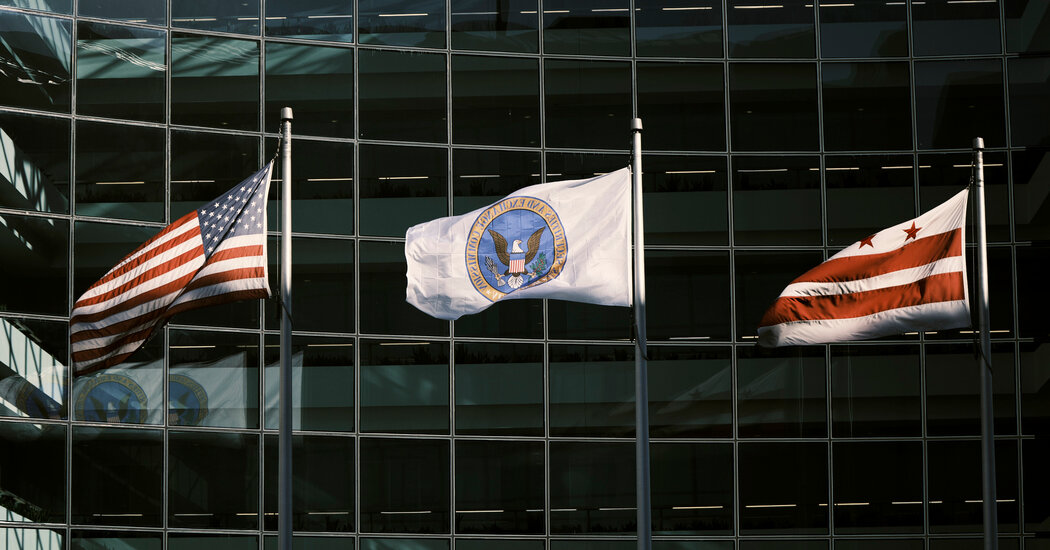Federal regulators on Wednesday approved a new financial product that tracks the price of Bitcoin, a landmark moment for the cryptocurrency industry that proponents hope will increase investment in the technology.
The Securities and Exchange Commission authorized 11 applications to offer exchange-traded funds tied to Bitcoin, a potentially simpler way for people to invest in digital assets. Some of the largest financial firms in the world, including the asset managers BlackRock and Fidelity, were approved to offer the products, known as E.T.F.s, which could begin trading as soon as Thursday on traditional platforms like the Nasdaq.
The approvals were hailed as a sign that mainstream financial institutions remain willing to deal in digital currencies even after 18 months of market crashes and high-profile bankruptcies. Since the fall, Bitcoin’s price has surged more than 60 percent, as traders bet that approval of the new crypto products would give the industry an imprimatur of regulatory legitimacy, drawing fresh investment from professional wealth managers and amateur traders.
The price of Bitcoin shot up on Tuesday after a post appeared on the S.E.C.’s official X account announcing the approval of the E.T.F.s, but dropped swiftly when Gary Gensler, the S.E.C. chair, said the agency’s account had been hacked.
Crypto enthusiasts had to wait only until Wednesday, when the S.E.C. authorized the products in a regulatory filing. Bitcoin’s price rose slightly after the announcement.
In a statement, Mr. Gensler, a fierce critic of fraud and volatility in the crypto markets, said the approvals should not be construed as an endorsement of the technology. “We did not approve or endorse Bitcoin,” he said. “Investors should remain cautious about the myriad risks associated with Bitcoin and products whose value is tied to crypto.”
Still, the long-awaited authorizations bring a pillar of the mainstream finance system into the experimental world of digital money.
Widely offered by financial firms like Charles Schwab and Vanguard, E.T.F.s are baskets of assets divided into shares that can be bought and sold on the open market — a form of investment popular among wealth managers who control trillions of dollars in capital.
Rather than storing Bitcoin in online wallets, investors in Bitcoin E.T.F.s would own shares in funds containing the digital currency. Investors would gain exposure to the market without some of the risks and inconveniences historically associated with crypto, a loosely regulated technology that allows people to exchange digital funds outside the supervision of banks or other traditional intermediaries.
“It creates a bridge to the traditional financial market,” said James Seyffart, a Bloomberg Intelligence analyst who tracks E.T.F.s. “Long term, I think money’s going to come in.”
Crypto proponents had pushed for the introduction of a Bitcoin E.T.F. for years, hoping it would accelerate adoption of cryptocurrencies more broadly. In 2021, the S.E.C. approved funds that track the fluctuations of Bitcoin without holding the currency itself. But the agency argued that a fund that contained Bitcoin would pose big risks to consumers, citing illegal manipulation of crypto prices, among other issues.
Those arguments failed in court. In August, the S.E.C. lost a legal battle with the crypto asset manager Grayscale Investments, one of the firms that applied to offer the product, clearing the path to a Bitcoin E.T.F.
Bitcoin’s price soon skyrocketed and this month reached nearly $47,000, its highest value since a series of bankruptcies sent the industry into a meltdown in 2022.
On social media, speculation raged about the timing of an approval by the S.E.C. The fake announcement on Tuesday prompted 15 minutes of celebration before Mr. Gensler intervened on X. An official X account for the platform’s safety resources said the agency had not enabled two-factor authentication, a common digital security tool, to protect its account.
Anticipation for the new crypto products had built for months. In November, BlackRock filed paperwork to create an E.T.F. tracking the price of Ether, the second-most-valuable cryptocurrency behind Bitcoin, prompting further excitement.
But skeptics argued the new products wouldn’t solve any of the fundamental problems in crypto, like fraud and volatility. A market crash in 2022 drained the savings of millions of ordinary investors. Critics said many crypto firms weren’t offering much practical utility.
In a public letter last week, the nonprofit advocacy group Better Markets said the approval of Bitcoin E.T.F.s would be a “historic mistake almost certainly leading to massive investor harm.” Others have argued that the products won’t provide much of a boost to crypto prices.
The growing prominence of companies like BlackRock in the crypto world also flies in the face of the renegade industry’s early promise to provide an alternative to mainstream financial behemoths.
“There’s so much irony and hypocrisy,” said John Stark, a former S.E.C. official and a longtime critic of crypto.
In his statement on Wednesday, Mr. Gensler said the court ruling in August had made approving the E.T.F.s “the most sustainable path forward.” But he said the decision “should in no way” signal that the S.E.C. was prepared to authorize similar products tied to other cryptocurrencies. He called Bitcoin a “speculative, volatile asset” used in money laundering, terrorist financing and other crimes.
Still, the industry celebrated.
“Today will be remembered in crypto history,” Richard Teng, the chief executive of Binance, the world’s largest crypto company, posted on X.
Brad Garlinghouse, the chief executive of the crypto firm Ripple, said on X that the “significance of this moment cannot be overstated.” He added, “Today’s news is further legitimization of crypto as an asset class.”
The companies authorized to offer Bitcoin E.T.F.s — which also include Grayscale, Franklin Templeton and several others — have already begun competing for customers. A few of them adjusted the management fees they plan to charge for the Bitcoin E.T.F.s this week, looking to undercut the competition. BlackRock lowered its fee to 0.25 percent from 0.3 percent.







